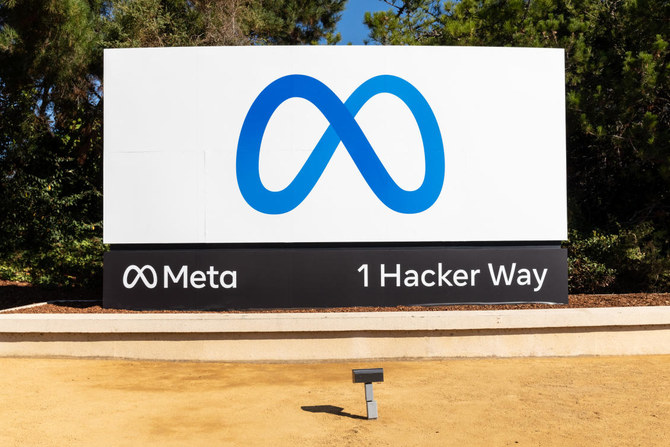BRUSSELS: Facebook whistleblower Frances Haugen warned Tuesday that the “metaverse,” the all-encompassing virtual reality world promised by the social media giant, will be addictive and rob people of yet more personal information while giving the embattled company another monopoly online.
In an interview with The Associated Press, Haugen said her former employer rushed to trumpet the metaverse because of the intense pressure it is facing after she revealed deep-seated problems at the company and energized legislative and regulatory efforts around the world to crack down on big tech companies.
“If you don’t like the conversation, you try to change the conversation,” the former product-manager-turned whistleblower said. The documents she has turned over to authorities and her testimony to lawmakers have drawn global attention for providing insight into what Facebook may have known about the damage its social media platforms can cause. She is in the midst of a series of appearances before European lawmakers and experts drawing up rules for social media companies.
Meta, the new name for the parent company of Facebook, denied it was trying to divert from the troubles it faces by pushing the metaverse. “This is not true. We have been working on this for a long time internally,” the company said in a statement.
It stressed that it’s working to responsibly build the metaverse — sort of the Internet brought to life, or at least rendered in 3D. CEO Mark Zuckerberg has described it as a “virtual environment” you can go inside of — instead of just looking at on a screen — and refocused Facebook’s business model on it, including renaming the company Meta.
Launching that new brand, in fact, draws attention to the company, it said in a statement, adding that if it didn’t want the scrutiny it would have delayed or scrapped the launch altogether.
But the new focus on metaverse creates a whole new set of dangers, Haugen said. In “Snow Crash,” the 1992 the sci-fi novel that coined the phrase, “it was a thing that people used to numb themselves when their lives were horrible,” she said.
“So beyond the fact that these immersive environments are extremely addictive and they encourage people to unplug from the reality we actually live,” she said, “I’m also worried about it on the level of — the metaverse will require us to put many, many more sensors in our homes and our workplaces,” forcing users to relinquish more of their data and their privacy.
She said employees of companies that use the metaverse would have little option but to participate in the system or leave their jobs.
“If your employer decides they’re now a metaverse company, you have to give out way more personal data to a company that’s demonstrated that it lies whenever it is in its best interests,” she said.
And she cautioned the public not to expect more transparency.
“They’ve demonstrated with regard to Facebook that they can hide behind a wall. They keep making unforced errors, they keep making things that prioritize their own profits over our safety,” she said.
Haugen has said Facebook’s systems amplify online hate and extremism, fail to protect young people from harmful content and that the company lacks any incentive to fix the problems, in revelations that shed light on an internal crisis at the company that provides free services to 3 billion people.
To back up her allegations, she made a series of disclosures to the Securities and Exchange Commission that were also provided to Congress in redacted form by her legal team. The redacted versions received by Congress were obtained by a consortium of news organizations, including the AP.
In Tuesday’s interview, she expressed astonishment that the company would shift focus to a whole new realm while it is under such intense criticism about the areas where it is already working.
“They’re going to hire 10,000 engineers to work on video games when they haven’t actually gotten safety right on their main product,” Haugen said.
For that, she faulted Zuckerberg personally.
“So given that I see this pattern of choices where he prioritizes growth and expansion over making sure what he has is good, I think that is a failure of leadership,” she said.
The company denied that it’s putting profits over safety. “Yes, we’re a business and we make profit, but the idea that we do so at the expense of people’s safety or wellbeing misunderstands where our own commercial interests lie,” it said, adding that it plans to spend more than $5 billion in 2021 on safety and security and employs more than 40,000 people work on keeping users safe.
Zuckerberg has previously dismissed Haugen’s claims as a “coordinated effort” to paint a false picture of the company.
But officials in Washington and European capitals are taking her claims seriously. European Union lawmakers questioned her intensely Monday, before applauding her at the end of the 2 1/2 hour hearing.
The EU is drafting new digital rules for the 27-nation bloc that call for reining in big “digital gatekeepers,” requiring them to be more transparent about algorithms that determine what people see on their feeds and making them more accountable for the content on their platforms.
Facebook has said it largely supports regulations, with legislative efforts in the EU and United Kingdom much further along than those in the US
Haugen has made stops in London and Berlin to speak to officials and lawmakers and spoke at a tech conference in Lisbon. She also will address French lawmakers in Paris on Wednesday.
Facebook whistleblower fears the metaverse
https://arab.news/ruq5c
Facebook whistleblower fears the metaverse

- Haugen’s documents have exposed an internal crisis at the social media giant, which provides free services to 3 billion people
NGOs warn Elon Musk of ‘collective punishment’ if Starlink in Sudan is shut down

- People and organizations rely on ‘unofficial’ Starlink connection for lifeline services
- Coalition of 94 humanitarian, human rights groups call for warring factions to repair damaged communication infrastructure
LONDON: Starlink’s chief Elon Musk has been urged not to shut down the satellite internet service in Sudan, as doing so could “collectively punish” millions of Sudanese.
In an appeal to the American billionaire, nearly 100 humanitarian, civil society, human rights organizations and members of the #KeepItOn coalition have highlighted the critical role Starlink plays as a lifeline for on-the-ground organizations operating in the war-torn African country. They warn that interrupting the service could have fatal consequences.
“Any shutdown of telecommunication services is a violation of human rights and may be considered to be a collective punishment that will not only isolate individuals from their support networks but also exacerbate the already dire economic situation facing millions,” said the coalition, which includes Save the Children, Islamic Relief Worldwide and Action Against Hunger, among others.
The statement added: “The potential shutdown of Starlink would have a disproportionate impact on civilians and the aid organisations who are trying to reach them.”
Sudan has been grappling with a widespread telecommunications blackout for several months, severely limiting emergency and humanitarian services and access to basic transactions such as cash transfers from abroad.
Starlink, which can operate across borders thanks to its satellite service, announced earlier this month that it would cease its services in Sudan by restricting roaming in jurisdictions where it is not licensed.
If confirmed, this decision risks provoking a permanent nationwide telecommunications shutdown, similar to the one in February 2024 that left almost 30 million Sudanese without access to the internet or telephone calls for more than a month.
The situation is further exacerbated by the damage and destruction of communication infrastructure, targeted by both the Rapid Support Forces and the Sudanese military.
The coalition, which relies on expensive and scarce satellite internet in areas where formal telecommunications are not functioning, has also urged the warring factions to repair the infrastructure.
SpaceX’s Starlink has been under pressure to maintain its connection since conflict broke out in Sudan in April 2023.
In August, a hacking group called Anonymous Sudan took X offline in more than a dozen countries to pressure Elon Musk into formally opening Starlink in Sudan.
In recent months, the company has been at the center of a public debate over its role in connecting war-torn areas worldwide.
Earlier in May, Bloomberg reported that SpaceX was close to finalizing a deal with the Yemeni government to provide satellite internet to the country in what experts described as a “victory” over the Houthi rebels.
In September 2023, several media outlets reported that Elon Musk denied a Ukrainian request to extend Starlink’s coverage to Crimea during a surprise attack.
Although this was later clarified as an erroneous claim that Musk “turned off” Starlink coverage in Crimea, it raised concerns about the service’s role during conflicts.
Dentsu opens sports practice in MENA with Riyadh HQ

DUBAI: International advertising group Dentsu has announced the launch of its dedicated sports practice, dentsu Sports International, in the Middle East and North Africa region.
The new practice, which focuses on sports marketing and analytics services, will be headquartered in Riyadh, Saudi Arabia, with additional offices in the UAE.
To provide end-to-end service to clients, the group brings together three dentsu businesses: dentsu Sports International Commercial, MKTG Sports + Entertainment and dentsu Sports Analytics.
Charlie Wylie, managing director for Europe, Middle East and Africa at dentsu Sports International, said: “dentsu Sports International will serve as a strategic sports and entertainment arm of dentsu in MENA, offering comprehensive solutions tailored to the needs of brands and rights holders.”
The company has appointed Olaf Borutz as vice president of commercial development, reporting to dentsu Sports International’s global chief commercial officer, Echo Li.
Borutz’s previous role as head of sports and events at law firm Al Tamimi & Company saw him advise clients on sports and events-related commercial matters, including government bodies, rights holders, agencies and players of the Saudi Pro League and Qatar Stars League.
“The appetite for sports marketing in the Kingdom is at an all-time high, with Saudi’s ambitions and investment in this space only expected to grow,” said Tarek Daouk, CEO, dentsu MENA.
A significant 62 percent of Saudi sports fans say that sport plays a bigger role in their lives than before, according to a new study conducted by dentsu Sports International.
The study also found that fans spend more time and money than their international counterparts on live events in the Kingdom, with Saudi fans attending an average of six events in person a year, more than the UK average of two events per year.
Saudi Arabia’s significant youth population is passionate about sports, with 68 percent of 18–24-year-old Saudis saying they find attending sports events more rewarding than other entertainment events.
The study also revealed that these younger consumers are the most likely to purchase premium tickets, spending 31 percent more a ticket than older fans.
Daouk said: “It’s an exciting time for sports in the region and we are thrilled to launch dentsu’s bespoke sports and entertainment offering.”
Tunisia remands journalists arrested over critical comments

- Broadcaster Borhen Bssais and political commentator Mourad Zeghidi were arrested Saturday under a decree criminalizing ‘spreading false information’ among other charges, spokesman Mohamed Zitouna said
TUNIS: A Tunisian court on Wednesday ordered two journalists to be held in remand until the completion of investigations into critical comments, a court spokesman said.
Broadcaster Borhen Bssais and political commentator Mourad Zeghidi were arrested Saturday under a decree criminalizing “spreading false information” among other charges, spokesman Mohamed Zitouna said.
Zeghidi is being investigated over social media statements last February and a post in support of Mohamed Boughalleb, another journalist and critic of President Kais Saied who has been detained separately.
Bssais was arrested on accusations of “having harmed President Kais Saied through radio broadcasts and statements” online between 2019 and 2022, according to his lawyer Nizar Ayed.
Their trial is set to begin on May 22, according to their lawyers.
Both media figures are prosecuted under a law ratified by Saied in September 2022.
The law punishes people with up to five years in prison for the use of social media to “produce, spread (or) disseminate ... false news” and “slander others, tarnish their reputation, financially or morally harm them.”
Journalists and opposition figures have said it has been used to stifle dissent.
Since the decree came into force, more than 60 journalists, lawyers and opposition figures have been prosecuted under it, according to the National Union of Tunisian Journalists.
The same night Bssais and Zeghidi were taken into police custody, masked police raided the Tunisian bar association and arrested lawyer Sonia Dahmani, also on the same law.
On Monday, another lawyer was forcibly arrested at the association’s headquarters.
The president of the bar, Hatem Meziou, on Tuesday called for an end to “the abuse of power” and “violence” targeting the lawyers.
The European Union also expressed concern over a string of arrests of civil society figures in Tunisia — the latest sign of a tightening clampdown on freedoms under Saied.
Nongovernmental organizations have decried a rollback of freedoms in Tunisia since Saied began ruling by decree after a sweeping power grab in 2021.
‘Blockout’ trend targets celebrities over Gaza silence

- Selena Gomez, Zendaya and Kim Kardashian are among the celebrities who have lost hundreds of thousands of followers
- Boycott campaign gained traction following Met Gala event last week in New York
LONDON: A new trend threatening to boycott celebrities over their refusal to speak out about the Gaza conflict is gaining momentum on social media.
Known as “Blockout 2024,” the movement has surged in popularity following the Met Gala last week.
As part of a solidarity campaign, social media users are calling for the blocking of accounts of celebrities who have remained silent on the humanitarian crisis in Gaza.
High-profile figures such as Taylor Swift, Justin Bieber, and Drake are among the hundreds of celebrities facing this “digital guillotine.”
A full list is circulating on social media, leading to a significant loss of followers on Instagram and other platforms.
Actress and singer Selena Gomez reportedly lost 1 million followers on Instagram and 100,000 on X, according to US-based social media analytics site Sonic Blue.
Fellow actress and singer Zendaya, reality TV star Kim Kardashian, and her sister Kylie Jenner have also seen hundreds of thousands of followers drop.
Pro-Palestinian activists have been pressuring celebrities for months to show more support for Gaza civilians. This growing discontent reached a tipping point last week when the Met Gala’s glitz and glamour coincided with Israel’s announcement of a military offensive in Rafah.
@ladyfromtheoutside #greenscreen #greenscreenvideo #digitine #digitalguillotine #haleyybaylee ♬ original sound - Meagan
The movement was sparked by a TikTok video from influencer Haley Kalil at the Met Gala on May 7, where she lip-synced to the phrase “Let them eat cake.”
This phrase, attributed to Queen Marie Antoinette, drew parallels to the French Revolution, symbolizing indifference to the suffering of the impoverished.
“It’s time for the people to conduct what I want to call a ‘digital guillotine.’ A ‘digitine,’ if you will,” said TikTok creator @ladyfromtheoutside, who kicked off the movement with her viral video.
“It’s time to block all the celebrities, influencers and wealthy socialites who are not using their resources to help those in dire need. We gave them their platforms. It’s time to take it back, take our views away, our likes, our comments, our money.”
According to Gaza authorities, at least 35,000 people, mostly women and children, have been killed in the Palestinian territory during the seven-month war, which has been widely condemned as failing to comply with international humanitarian law.
BBC investigation leads to arrest of one of world’s most notorious people smugglers

- Barzan Majeed, nicknamed ‘Scorpion,’ is caught in Iraqi Kurdistan days after release of BBC podcast series by journalists who tracked him down and interviewed him
- Senior local official confirms officials used information from the broadcaster’s investigation to help find fugitive believed to have helped smuggle thousands of people to UK
DUBAI: Kurdish security forces arrested Barzan Majeed, described as one of the world’s most notorious people smugglers, in Iraqi Kurdistan on Sunday morning.
Nicknamed “Scorpion,” the fugitive is believed to have been involved in smuggling an estimated 10,000 people across the English Channel to the UK. He was arrested days after the release of a BBC podcast series in which investigative journalists tracked him down to the city of Sulaymaniyah in Iraq and interviewed him there.
During the interview, Majeed said he had lost count of the number of people he helped to smuggle, adding: “Maybe a thousand, maybe 10,000. I don’t know, I didn’t count.”
He admitted that between 2016 and 2019 he was one of two people who helped run a people-smuggling operation in Belgium and France but denied he was the mastermind of the operation.
“A couple of people, when they get arrested, they say, ‘We’re working for him’ — they want to get less (of a) sentence,” he said.
Originally from Iraq, Majeed moved to the city of Nottingham, in England, in 2013 but was deported two years later. He had been on the run since failing to appear at a court in Belgium for a sentencing hearing in November 2022.
The UK’s National Crime Agency issued a warrant for his arrest that same year. The agency, which confirmed his arrest, said: “We are grateful to the BBC for highlighting his case and remain determined to do all we can to disrupt and dismantle the criminal networks involved in smuggling people to the UK, wherever they operate.”
A senior member of the Kurdistan Regional Government confirmed its officials had used information from the BBC investigation to locate and arrest Majeed.
Each year, thousands of people flee Iraq, including its Kurdistan Region, in the hope of finding a better life in the UK or other parts of Europe. In many cases, they pay people smugglers to transport them, but the routes and methods used by the smugglers are often dangerous and the migrants face harsh weather and potentially deadly travel conditions.
Germany deported 222 Iraqi citizens in the first three months of this year as part of an alleged agreement between Berlin and Baghdad to deport migrants who do not qualify to remain in Germany, media organization Rudaw, which is based in Iraqi Kurdistan, reported this week.





















